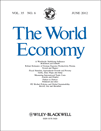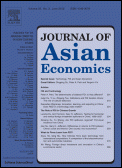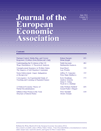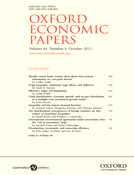
Baltic Journal of Economics
Scope & Guideline
Catalyzing discussions on pressing social science issues.
Introduction
Aims and Scopes
- Regional Economic Analysis:
The journal focuses on examining economic issues specific to the Baltic states and Central and Eastern Europe, including GDP inequality, labor market mismatches, and the effects of fiscal policies. - Impact of Globalization and Investment:
Research on the role of global value chains, foreign direct investment, and regional integration highlights the journal's commitment to understanding how these factors influence local economies. - Socioeconomic Disparities:
The journal addresses issues such as wealth disparities, gender wage gaps, and educational mismatches, contributing to discussions on equity and economic development. - Empirical Investigations:
A strong emphasis on empirical research, utilizing quantitative methods to analyze economic data and trends, is a hallmark of the journal's publications. - Policy Evaluation and Recommendations:
Articles often evaluate fiscal policies, tax incentives, and economic reforms, providing insights that can inform policymakers in the region.
Trending and Emerging
- Digital Economy and Labor Market Dynamics:
Recent publications increasingly focus on labor market mismatches and the effects of COVID-19 on earnings, highlighting the need to understand how digital transformation and global crises affect employment. - Wealth and Income Disparities:
Research on wealth disparities among different demographics, particularly the elderly and immigrants, is becoming more prominent, emphasizing the importance of social equity in economic discourse. - Sustainability and Economic Resilience:
There is a growing interest in the sustainability of economic practices, as evidenced by studies on informal economies and productivity spillovers, reflecting broader global concerns about sustainable growth. - Financial System Analysis:
An increase in studies analyzing banking practices, lending rates, and fiscal policies indicates a trend toward understanding the financial systems' role in economic stability and growth.
Declining or Waning
- Historical Economic Analysis:
Although historical perspectives, such as the analysis of Latvia's economic growth in the interwar period, have been published, this theme appears to be less frequent, suggesting a shift towards more contemporary issues. - Agricultural Economics:
Research focusing specifically on agricultural practices, such as the investment behavior of dairy farms, has become less prominent, indicating a potential waning interest in this sector within the journal. - Minimum Wage Studies:
Investigations into the effects of minimum wage policies, while relevant, have seen fewer publications, suggesting that this area may not be as central to current economic discussions in the Baltic context. - Labor Market Studies:
While labor market issues remain important, the specific focus on overeducation and cognitive skills in relation to wages appears to be declining, possibly overshadowed by broader economic challenges.
Similar Journals

Economies
Pioneering research in economics, finance, and policy.Economies is a premier open-access journal published by MDPI, dedicated to advancing the fields of economics, econometrics, and finance since its inception in 2013. With an E-ISSN of 2227-7099, the journal plays a vital role in disseminating high-quality research that addresses contemporary global economic challenges, fostering a collaborative platform for scholars, industry professionals, and policymakers alike. The journal is based in Switzerland and has gained significant recognition in the academic community, evidenced by its Q2 ranking in both Development and Economics, Econometrics and Finance categories, along with impressive Scopus rankings—55th out of 242 in Economics and 79th out of 306 in Social Sciences Development. This positions Economies as a key resource for those seeking to stay at the forefront of economic research and thought leadership. The journal’s commitment to open access ensures that valuable insights and findings are readily available to the global research community, enhancing knowledge sharing and innovation in the field.

WORLD ECONOMY
Elevating discussions on pressing economic issues worldwide.WORLD ECONOMY is a premier academic journal published by Wiley, renowned for its rigorous peer-reviewed research in the fields of economics, finance, accounting, and political science. Established in 1977, the journal has consistently contributed to the advancement of knowledge, reflected in its strong standing across various category quartiles, notably achieving Q1 in Accounting and Political Science, and ranking in the top quartile in its respective disciplines as of 2023. With an audience that spans researchers, professionals, and students, WORLD ECONOMY publishes impactful articles that explore critical issues affecting the global economy. Although it is not an open-access publication, readers have access options to engage with cutting-edge research that addresses both theoretical and practical aspects of world economic trends. The journal's commitment to excellence is further underscored by its impressive Scopus rankings, situating it among the top journals in the social sciences arena. For anyone keen on deepening their understanding of the dynamics shaping our economic landscape, WORLD ECONOMY remains an indispensable resource.

Frontiers of Economics in China
Advancing Insights into China's Economic EvolutionFrontiers of Economics in China is a distinguished academic journal published by HIGHER EDUCATION PRESS, focusing on the dynamic and rapidly evolving field of economics within the Chinese context. With an ISSN of 1673-3444 and an E-ISSN of 1673-3568, this journal has been instrumental since its inception in 2006 in disseminating high-quality research and fostering dialogue among scholars, professionals, and students. Although the journal's coverage in Scopus has been discontinued as of 2024, it remains a valuable resource, providing unique insights into economic trends and policies in China. While currently holding a Scopus ranking of #472 out of 696, the journal operates in the Economics and Econometrics category, reflecting its commitment to contributing to the global economic discourse. With Open Access options, readers can easily access its articles, ensuring that important findings reach a wide audience, thereby enhancing the collaborative spirit within the academic community.

Ekonomicheskaya politika
Shaping the future of economic discourse in Russia and beyond.Ekonomicheskaya politika, published by EKONOMICESKAA POLITIKA, is a premier journal dedicated to advancing the fields of economics, finance, and the sociopolitical dimensions impacting economic policies, particularly within the Russian context. Established in 2013, it plays a crucial role in addressing contemporary economic challenges and contributing to scholarly discourse. The journal is indexed in Scopus, demonstrating its relevance and scholarly impact, with its rankings and quartiles reflecting a strong commitment to quality research. Although it operates under a traditional access model, its comprehensive analyses and thought-provoking articles are essential resources for researchers, professionals, and students alike, fostering a deeper understanding of economic trends and policy implications in both global and local arenas. With its convergence of interdisciplinary approaches from economics, political science, and sociology, Ekonomicheskaya politika not only serves as a valuable academic platform but also as a critical reference point for policymakers and practitioners interested in the evolving landscape of economic policy.

Gospodarka Narodowa-The Polish Journal of Economics
Advancing economic discourse for a changing world.Gospodarka Narodowa - The Polish Journal of Economics is a prestigious, peer-reviewed journal dedicated to advancing knowledge in the field of economics. Published by SZKOLA GLOWNA HANDLOWA, KOLEGIUM ANALIZ EKONOMICZNYCH, this journal has been an essential resource since its inception in 2000, providing open access to its valuable research findings to foster academic collaboration and accessibility. With a focus on contemporary economic issues, policies, and trends, the journal serves as a crucial platform for scholars, practitioners, and students alike to explore innovative economic theories and applications, both within Poland and globally. By promoting critical analysis and empirical research, Gospodarka Narodowa contributes significantly to the discourse in economic science, making it a vital resource for anyone interested in this dynamic field.

Journal of Asian Economics
Advancing Insights into Asia's Economic LandscapeThe Journal of Asian Economics, published by Elsevier, serves as a pivotal platform for scholars and practitioners engaged in the comprehensive study of economic issues within Asia. With an ISSN of 1049-0078 and an E-ISSN of 1873-7927, this esteemed journal encompasses a wide array of topics in its scope, ranging from macroeconomic policy analysis to the intricacies of financial markets in the Asian context. Ranking in the Q2 category for both Economics and Econometrics and Finance, according to the 2023 metrics, it is positioned among the top-tier journals, currently holding a significant place at the 73rd percentile in Finance and 72nd percentile in Economics. This journal not only caters to academic researchers looking to publish their findings but also serves as an essential resource for professionals and students seeking to deepen their understanding of the dynamic economic landscape in Asia. By bridging empirical research and practical insights, the Journal of Asian Economics plays a crucial role in advancing knowledge and encouraging discourse in the field.

Equilibrium-Quarterly Journal of Economics and Economic Policy
Empowering Discourse on Contemporary Economic ChallengesEquilibrium-Quarterly Journal of Economics and Economic Policy is a leading open-access journal, published by the Institute of Economic Research in Poland. Since its inception in 2011, this journal has served as a vital platform for disseminating innovative research and scholarly discourse in Economics and Economic Policy. The journal maintains a high impact within the academic community, currently holding a Q2 ranking in Economics and Econometrics and a Q1 ranking in the miscellaneous category of Economics, Econometrics, and Finance as of 2023. With an impressive Scopus ranking, it sits at #8 out of 242 in its field, demonstrating its commitment to quality and relevance in contemporary economic research. The journal welcomes contributions that advance theoretical and empirical discussions, encompassing a broad spectrum of topics in economics, thereby appealing to researchers, professionals, and students alike. Through its open access model, Equilibrium ensures widespread availability of knowledge and fosters collaboration across disciplines within the global economic community.

Journal of the European Economic Association
Fostering Innovative Research for a Global EconomyThe Journal of the European Economic Association, published by Oxford University Press, stands as a cornerstone in the field of economics, boasting a strong impact factor that reflects its high citation rates and significance among peers. With an impressive Scopus ranking of 12 out of 288 in general economics, encompassing a remarkable 96th percentile, this journal is recognized for its rigorous peer-reviewed research contributions that advance the understanding of economic theory and policy. Dedicated to publishing innovative studies and theoretical advancements since its inception in 2003, it continues to engage scholars worldwide, providing vital insights applicable to both academia and industry. Although it does not follow an open-access model, the journal's extensive reach and commitment to excellence make it an essential resource for researchers, professionals, and students seeking to deepen their understanding of contemporary economic issues. Based in the United States, the journal reflects a European perspective on global economic challenges, making it indispensable for those at the forefront of economic research.

ECONOMIST-NETHERLANDS
Advancing Economic Insights Since 1852The Economist-Netherlands, published by Springer, is a prestigious journal that has been a cornerstone in the field of economics since its inception in 1852. With a strong focus on disseminating high-quality research and insights, this journal serves as an essential resource for economists, researchers, and practitioners interested in the dynamic landscape of economic theory and applications. Currently ranked in the Q3 category in Economics and Econometrics, this journal demonstrates a commitment to scholarly rigor, as reflected in its Scopus ranking within the 55th percentile. The journal features an extensive scope that encompasses key topics relevant to both historical and contemporary economic challenges, fostering a vibrant academic discourse. While access is not open, the journal remains a vital publication for anyone seeking to advance their knowledge in the economic sector. With an enduring legacy, the Economist-Netherlands continues to contribute significantly to the evolution of economic scholarship.

OXFORD ECONOMIC PAPERS-NEW SERIES
Bridging theory and practice in economic research.OXFORD ECONOMIC PAPERS-NEW SERIES is a prestigious academic journal published by Oxford University Press, dedicated to advancing the field of economics and econometrics. With an ISSN of 0030-7653 and an E-ISSN of 1464-3812, this journal has a rich history since its inception in 1938, and continues to play a vital role in disseminating impactful research through its convergence of years spanning from 1938 to 2024. Recognized as a Q2 journal in the 2023 category of Economics and Econometrics, it ranks #396 among 716 in its field according to Scopus, reflecting a commendable position within the academic community, particularly in global economic discussions. While the journal currently does not offer open access options, it remains committed to providing a platform for rigorous research and critical discourse. Researchers, professionals, and students will find the journal's articles to be essential reading, offering insights that are pivotal for understanding economic trends, policies, and methodologies. Its focus on high-quality scholarship ensures that contributions are both theoretically robust and practically relevant, making it a significant resource in the ever-evolving landscape of economic research.